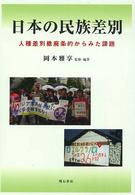基本説明
The articles present the problems and issues facing education in the region and the findings of research conducted within the region that contribute to the resolution of these problems and issues.
Full Description
The aim of this handbook is to present readily accessible, but scholarly sources of information about educational research in the Asia-Pacific region. The scale and scope of the book is such that the articles included in it provide substantive contributions to knowledge and understanding of education in the Asia region. In so doing, the articles present the problems and issues facing education in the region and the findings of research conducted within the region that contribute to the resolution of these problems and issues. Moreover, since new problems and issues are constantly arising, the articles in the handbook also indicate the likely directions of future developments. The different articles within the handbook seek to conceptualize the problems in each specific content area under review, provide an integration of the research conducted within that area, the theoretical basis of the research the practical implications of the research and the contribution of the research towards the resolution of the problems identified.
Thus, the articles do not involve the reporting of fresh research, but rather require a synthesis of the research undertaken in a particular area, with reference to the research methods employed and the theoretical frameworks on which the research is based. In general, the articles do not advocate a single point of view, but rather, present alternative points of view and comment on the debate and disagreements associated with the conduct and findings of the research. Furthermore, it should be noted, that the handbook is not concerned with research methodology, and only considers the methods employed in inquiry in so far as the particular methods of research contribute to the effective investigation of problems and issues that have arisen in the conduct and provision of education at different levels within the region.








